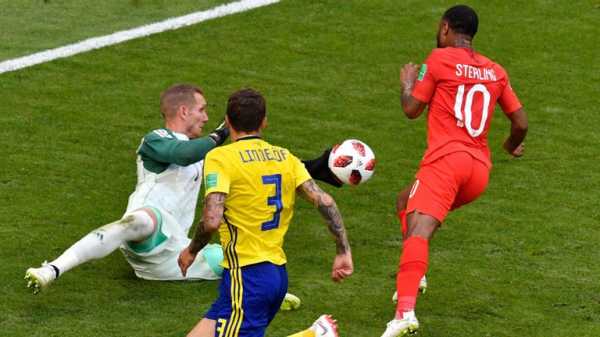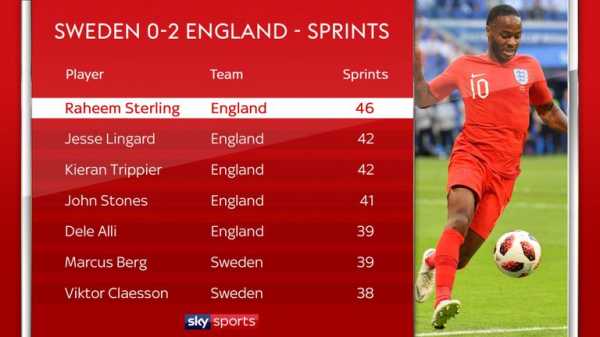
England are flying but one player continues to receive criticism. Here, Adam Bate takes a look at why Raheem Sterling’s role in the team’s success should not be overlooked.
England are into the semi-finals of the World Cup for the first time in 28 years and Gareth Southgate’s side look certain to be mentioned in the same breath as the heroes of Italia ’90 whatever happens now. These players have captured the imagination of a nation. Replicating the achievements of 1966 let alone 1990 could be only a week away.
It is natural that favourites have emerged. Harry Kane’s brilliance is no surprise. But Kieran Trippier and Jesse Lingard have surpassed expectations, while Harry Maguire and Jordan Pickford starred against Sweden. And yet, the performances of Raheem Sterling continue to receive criticism – perhaps the one man in this team who still divides opinion.
A glance at social media would suggest that even that is a generous interpretation. There were plenty united in their abuse of the Manchester City forward after seeing him fail to convert two one-on-one opportunities in the final moments of the first half, albeit one of them would not have counted anyway as Sterling was correctly ruled to have been offside.
Gary Neville was among those appalled by some of the reaction that he spotted to those missed chances. “The actual treatment at half-time across social media was absolutely disgusting and is not representative of the performance he put in,” the Sky Sports pundit told ITV. Where Sterling is concerned rational analysis rarely seems to come into it.
His role in England’s success under Southgate is being undervalued by many. In fact, some seem to be overlooking his contribution entirely. The BBC has invited the public to rate the players after each game at this World Cup and Sterling has been England’s lowest-ranked performer in every single one of the four games in which he has featured so far.
Has the sustained criticism that the 23-year-old Sterling has received from some of the country’s most popular newspapers influenced the views of the masses? Or is it that these papers are merely reflecting the views of the public? Either way, it seems many are not seeing what the England manager continues to see in the player.
Southgate clarified his position prior to the Colombia game, outlining the reasons why Sterling is not only expected to retain his place in England’s starting line-up but is actually regarded by those who matter as central to the team’s success. “I have great belief in him,” he explained. “He has been a really important part of the team.
“In the last five or six games, with the change of system, he has been key. His movement, his ability to run at teams from deep, his interchanging of position with the other forward players is very important. At times, I have wondered why there has been such a focus on his position in the team and not others but that’s the way it has been.”

Certainly, any evidence that England are more effective in Sterling’s absence is flimsy. When Marcus Rashford got his start against Belgium, he did not convince – even spurning a one-on-one chance of his own. When Jamie Vardy came on for Sterling against Colombia, that did not work either – the team conceding immediately and looking disjointed in extra time.
The fluidity of Sterling’s movement might help to explain why. As Southgate suggests, he frequently drops deep to vacate the spaces that Jesse Lingard and Dele Alli run into and this interchange drags defenders out of position. But unlike many support strikers, Sterling also has the pace to trouble the opposition defence by making runs in behind them as well.

He made no fewer than 46 high-intensity sprints in the win over Sweden – more than any other player on the pitch. This is not a new trend. Against Colombia, he made 44 of them. There is intelligence to his movement too – the run for his clearest chance began before the ball had even reached Jordan Henderson, the team-mate who lofted the ball over the top.
Coaches also tend to place huge emphasis on the importance of penalty box entries with the ball – a 2013 study having demonstrated that the number of times that a team does this is a key performance indicator. Against Sweden, the statistics show Sterling was responsible for three of the six penalty-box entries by England with the ball at their feet.
Sterling’s key moments
19 – A good run leads to a Kane shot from distance that he drags wide
29 – Does really well to drop into the pocket and spread play to Young
44 – Adjudged offside when clean through but sees shot saved anyway
45 – Through again and controls well but cannot round the goalkeeper
54 – Attempts an overhead kick but can’t get the right connection on it
68 – Put through in the left channel by Alli but cross to Kane is blocked
90+1 – Replaced by Rashford in stoppage time with the game now won
The threat he posed in stretching the defence would not have been lost on Andreas Granqvist, that’s for sure. The burly centre-back was scrambling to clear as Sterling bore down on him as early as the 10th minute and later in the half he was forced to find touch again on the edge of his penalty box as the number 10 darted beyond him once more.
Ironically, nothing illustrated this more clearly than that crazy minute just before the break when Sterling got in behind the Sweden defence three times in a row without getting his reward. “He kept getting in and getting in,” said Neville. “OK, we didn’t have the cherry on the cake, the goal, where all of a sudden you’re a hero, but it was a brilliant performance.”

There can be no denying Sterling is due a goal. It is now 24 international appearances and almost three years since he last found the net for his country. He will be aware of that. Southgate’s observation that Alli had endured “some drought” in an England shirt suggests it might be in his manager’s mind too – the Tottenham midfielder had only gone 13 games without a goal.
But behind those headline-making numbers, Southgate also knows there are many others – not least the results themselves. Sterling’s understanding with his team-mates is part of why this is already the most successful England side in a generation. If more supporters can come to appreciate that then this very best of summers would be even better.
Comment below to get involved in the debate, but please adhere to our House Rules. If you wish to report any comment, simply click on the down arrow next to the offending comment and click ‘Report’.
Also See:
Sourse: skysports.com






